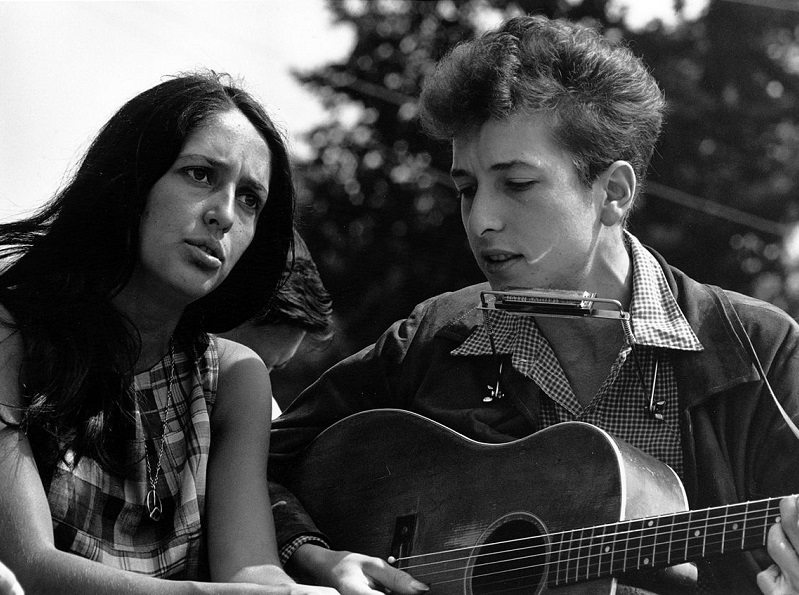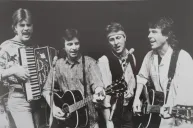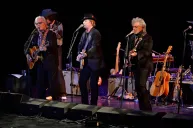Just as Bob Dylan had a well-documented late '60s stay in Nashville, Joan Baez logged her own studio hours in Music City with some of the era's best session players.
Videos by Wide Open Country
Baez's time with the musicians collectively known as the Nashville Cats netted two albums -- 1968 Dylan covers album Any Day Now and, from the same sessions, 1969's David's Album. The latter provides a musical overview of Southern roots music, dedicated to then-husband David Harris.
Songs on David's Album range from Appalachian folk standard "Will The Circle Be Unbroken," recorded a few years before the Nitty Gritty Dirt Band made it a rallying point for Carter Family devotees, to contemporary pop-country hit "Green, Green Grass of Home."
Beyond those choices, an accidental theme emerges when looking at three songs' original performers. When Baez sings "Tramp on the Street," "Hickory Wind" and an excerpt from "Take My Hand, Precious Lord," she weaves together a glimpse at Georgia's role in the evolution of modern sacred and secular music. Two Peach State-born Nashville Cats--guitarist and future Hall of Famer Jerry Reed and pedal steel pioneer Pete Drake-- help tie together this loose narrative.
"Only a Tramp..."
Baez's version of "Tramp on the Street" likely stands out to fans of Hank Williams. A deep cut from Williams' surviving radio appearances, its lyrics contrast the prominence of vagrants after the Great Depression with the Biblical story of Jesus and Lazarus.
Although his rendition likely inspired the dozens of folk, country, bluegrass and Southern gospel covers that followed, Williams did not write the song. Those honors belong to Northwest Georgia's Grady and Hazel Cole. In the age of "hillbilly" radio stars, the Coles and their youngest son, Jackie, worked their way up in the 1940s from a live show in Rome, Ga. to a coveted spot on Knoxville's Tennessee Hayride-- an influential program that at times boasted the talents of a young Chet Atkins and Kitty Wells' husband, Johnnie Wright.
As television began overshadowing live radio performances, Grady and Hazel's true legacy became "Tramp on the Street," a song the couple first recorded in 1939. On the heels of hard times, the Coles offered a message of hope through the Gospel.
"Precious Lord, Take My Hand..."
Her take of another country-gospel standard, "Just a Closer Walk With Thee," begins with a solemn hat-tip to the role African American churches played in the modernization of recorded music. With only a soft organ accompaniment, Baez sings a portion of Thomas A. Dorsey's "Take My Hand, Precious Lord."
Dorsey was born in Villa Rica, Ga. and first came of age as the blues musician Georgia Tom. As a minister in Chicago, Dorsey combined secular jazz and blues elements with songs of praise, earning himself the moniker "father of black gospel music." Mahalia Jackson later turned Dorsey's greatest composition into an anthem for Civil Rights activists.
Read More: The Lasting Impact of Bob Dylan's 'Nashville Skyline'
"Callin' Me Home, Hickory Wind"
A third song with Georgia ties is "Hickory Wind," a Gram Parsons co-write that had appeared a year earlier on the Byrds' Sweethearts of the Rodeo. Parsons, a native of Waycross, Ga., had headed West to forever narrow the sonic and ideological gaps between rock, folk and country music. Like Dorsey before him, Parsons injected the music of a different region with the sounds of Southern church houses and barrooms.
An Ear For Timeless Material
Like A.P. Carter of the famed Carter Family, Baez worked as a true folklorist with the Nashville Cats. She revived songs both old and new, framing them to fit her message of peace and acceptance. Through these selections , she follows the Coles Depression-era cue, looking to songs of faith and home for clarity in troubled times.




